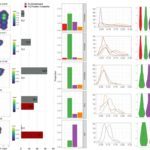Lien vers Pubmed [PMID] – 33301041
Lien DOI – 10.1093/nar/gkaa966
Nucleic Acids Res 2020 Dec; 48(21): 12102-12115
In bacteria, DNA methylation can be facilitated by ‘orphan’ DNA methyltransferases lacking cognate restriction endonucleases, but whether and how these enzymes control key cellular processes are poorly understood. The effects of a specific modification, 4-methylcytosine (4mC), are even less clear, as this epigenetic marker is unique to bacteria and archaea, whereas the bulk of epigenetic research is currently performed on eukaryotes. Here, we characterize a 4mC methyltransferase from the understudied pathogen Leptospira spp. Inactivating this enzyme resulted in complete abrogation of CTAG motif methylation, leading to genome-wide dysregulation of gene expression. Mutants exhibited growth defects, decreased adhesion to host cells, higher susceptibility to LPS-targeting antibiotics, and, importantly, were no longer virulent in an acute infection model. Further investigation resulted in the discovery of at least one gene, that of an ECF sigma factor, whose transcription was altered in the methylase mutant and, subsequently, by mutation of the CTAG motifs in the promoter of the gene. The genes that comprise the regulon of this sigma factor were, accordingly, dysregulated in the methylase mutant and in a strain overexpressing the sigma factor. Our results highlight the importance of 4mC in Leptospira physiology, and suggest the same of other understudied species.












